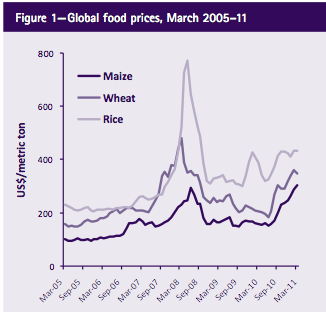This is a guest post by Shenggen Fan, Director General, International Food Policy Research Institute (IFPRI). The Development Policy Centre is hosting a seminar by Dr Fan on 29 April at the ANU’s Crawford School.
Although much progress has been made in reducing global poverty and hunger, hundreds of millions of people remain hungry and malnourished and many more are at risk. Just three years after the 2007-08 food crisis, the food security of poor and vulnerable people, especially women and children in developing countries, is once again being threatened as the prices of agricultural commodities soar and become more volatile.
Global food security is under stress from a complex web of factors, including rising energy prices, expanding biofuel production, U.S. dollar depreciation, food export bans, and extreme weather events resulting from a changing climate. In December 2010-January 2011, for example, heavy rain across eastern Australia, the world’s fourth-largest wheat exporter, damaged crops, disrupted exports, and reduced much of Queensland’s wheat harvest to low-grade feed. These current and emerging challenges to food security follow years of under investment in agriculture in developing countries, which has led to sluggish growth in agricultural productivity and food production.
High and volatile food prices
Since last June, the international prices of maize and wheat have almost doubled (see Figure 1). The costs of fruits, vegetables, eggs, meat, and dairy products have also increased rapidly, driving up food inflation in many countries—including those where the world’s poorest consumers spend 50-70 percent of their incomes on sustenance. Between March 2010 and March 2011, for example, food inflation rose in China and Indonesia by 12 percent and 14 percent, respectively, with the poorest people bearing the brunt of the burden.
Energy and biofuels
Increasingly expensive energy, in the form of fossil fuels, has added to the pressure on food prices in two ways. It has pushed up fertilizer and transportation costs and, by making the production of biofuels more profitable, intensified competition over the use of maize and other grains for food versus fuel. Biofuel production is projected to more than double between 2007-09 and 2019, and demand for it is expected to grow four-fold between 2008 and 2035. However, if second-generation technologies are used to sustainably produce biofuels from the non-edible parts of crops, such as stems, leaves, and husks, or from jatropha and other nonfood crops, the price of maize and maize-dependent commodities such as beef could fall. If these new biofuels succeed in lowering food prices, they could actually improve global food security. Public policy must help to ensure positive outcomes by encouraging the right investments and removing measures, such as maize ethanol subsidies, that encourage the use of food crops for fuel.
Climate change
The recent floods in Australia offer a glimpse of a future negatively affected by climate change and increasingly severe weather. Agricultural yields are expected to decline dramatically in many parts of the world, pushing millions of poor people deeper into poverty and hunger. Using sophisticated computer modeling, IFPRI projects that between now and 2050, climate change will cause wheat yields to fall in all regions of the world, with the largest losses in developing countries. Prices could rise by 42-131 percent in the case of maize, 11-78 percent for rice, and 17-67 percent for wheat, depending on the state of the world’s climate, economy, and population.
Improving agricultural productivity and strengthening agricultural trade would help countries cope with crop losses and deal with the uncertainty and variability that climate change will bring.
Recommendations and conclusion
Based on critical analysis of the 2007-08 food crisis and its causes, IFPRI recommends a comprehensive approach that incorporates seven principal measures to forestall future crises:
- Promote effective policies and technology investments to minimize competition between food and fuel.
- Provide social protection programs, especially productive safety nets for women and children.
- Support transparent, fair, and open global trade in agricultural goods.
- Establish a global humanitarian emergency grain reserve.
- Encourage policies and investments which promote agricultural growth, particularly by improving smallholder productivity.
- Invest in climate change adaptation and mitigation.
- Establish an international working group to monitor the world food situation and catalyze action to prevent excessive volatility.
Despite the myriad threats to global food security, the scourge of hunger and malnutrition can be prevented—if developed and developing countries and international organizations take decisive action now. Given the strong agricultural position of Australia, it could play a leading role in efforts to prevent recurring food crises.
The International Food Policy Research Institute (IFPRI) seeks sustainable solutions for ending hunger and poverty. IFPRI is one of 15 centers supported by the Consultative Group on International Agricultural Research, an alliance of 64 governments, private foundations, and international and regional organizations. www.ifpri.org.
Further analysis on preventing recurring food crisis can be found in this IFPRI Policy Brief.



Leave a Comment